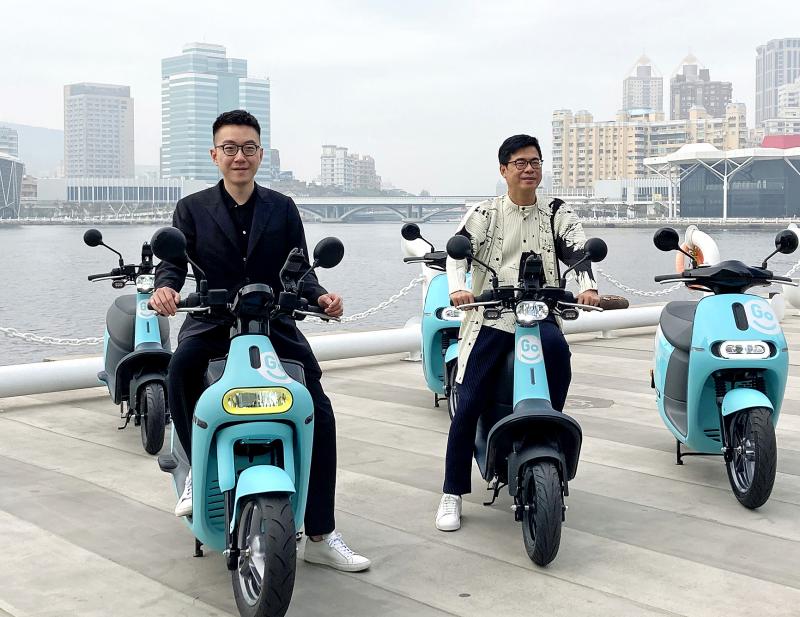GoShare Taiwan Ltd (睿能數位服務) yesterday expanded its electric scooter sharing services to Kaohsiung in an effort to scale up its customer base, while joining three other peers to vie for a share of the growing sustainable mobility market.
GoShare, a subsidiary of electric scooter maker Gogoro Inc (睿能創意), plans to deploy 700 electric scooters in Kaohsiung in the initial stage, GoShare head Henry Chiang (姜家煒) told a media briefing yesterday.
The scooters would be available in parking areas adjacent to the city’s MRT stations, Chiang said.

Photo: Lisa Wang, Taipei Times
“The sharing service is not intended to replace the mass transportation system, but to play a supplementary role,” Chiang said. “Tapping into Kaohsiung, we hope to make a breakthrough in our user numbers this year.”
GoShare saw strong growth last year, with its number of users soaring 150 percent annually to more than 1 million since its launch in August 2019.
“The company is looking to deepen its partnership with the Kaohsiung City Government to provide sharing services at sightseeing sites,” Chiang said.
The company works with the New Taipei City Government in offering “GoShare Dots” along the 11km northeastern coast of Taiwan, a popular sightseeing route, allowing travelers to rent electric scooters and return them at 11 sites.
To celebrate the service launch in Kaohsiung, GoShare is offering a free ride for all users nationwide for a limited period, Chiang said.
GoShare has deployed 6,000 electric scooters across the nation, with more than 2,000 battery swap stations, he said.
The firm’s services are available in Taipei, New Taipei City, Yunlin County, Tainan and Kaohsiung.
Before GoShare entered the Kaohsiung market, other sharing service providers — Wemo Corp (威摩科技), Hotai Leasing Corp (和運租車) and Gokube Inc (夠酷比) — had deployed a combined 3,000 electric scooters in the city.
GoKube’s services are only available in Kaohsiung, while Wemo last week said that it was expanding its services to Kaohsiung’s Sanmin (三民), Cianjhen (前鎮) and Fengshan (鳳山) districts.
To promote its sharing services, Wemo is offering free rides to customers in Kaohsiung until the end of the Lunar New Year holiday next month.

Semiconductor business between Taiwan and the US is a “win-win” model for both sides given the high level of complementarity, the government said yesterday responding to tariff threats from US President Donald Trump. Home to the world’s largest contract chipmaker, Taiwan Semiconductor Manufacturing Co (TSMC, 台積電), Taiwan is a key link in the global technology supply chain for companies such as Apple Inc and Nvidia Corp. Trump said on Monday he plans to impose tariffs on imported chips, pharmaceuticals and steel in an effort to get the producers to make them in the US. “Taiwan and the US semiconductor and other technology industries

A start-up in Mexico is trying to help get a handle on one coastal city’s plastic waste problem by converting it into gasoline, diesel and other fuels. With less than 10 percent of the world’s plastics being recycled, Petgas’ idea is that rather than letting discarded plastic become waste, it can become productive again as fuel. Petgas developed a machine in the port city of Boca del Rio that uses pyrolysis, a thermodynamic process that heats plastics in the absence of oxygen, breaking it down to produce gasoline, diesel, kerosene, paraffin and coke. Petgas chief technology officer Carlos Parraguirre Diaz said that in

CHIP WAR: Tariffs on Taiwanese chips would prompt companies to move their factories, but not necessarily to the US, unleashing a ‘global cross-sector tariff war’ US President Donald Trump would “shoot himself in the foot” if he follows through on his recent pledge to impose higher tariffs on Taiwanese and other foreign semiconductors entering the US, analysts said. Trump’s plans to raise tariffs on chips manufactured in Taiwan to as high as 100 percent would backfire, macroeconomist Henry Wu (吳嘉隆) said. He would “shoot himself in the foot,” Wu said on Saturday, as such economic measures would lead Taiwanese chip suppliers to pass on additional costs to their US clients and consumers, and ultimately cause another wave of inflation. Trump has claimed that Taiwan took up to

SUBSIDIES: The nominee for commerce secretary indicated the Trump administration wants to put its stamp on the plan, but not unravel it entirely US President Donald Trump’s pick to lead the agency in charge of a US$52 billion semiconductor subsidy program declined to give it unqualified support, raising questions about the disbursement of funds to companies like Intel Corp and Taiwan Semiconductor Manufacturing Co (台積電). “I can’t say that I can honor something I haven’t read,” Howard Lutnick, Trump’s nominee for commerce secretary, said of the binding CHIPS and Science Act awards in a confirmation hearing on Wednesday. “To the extent monies have been disbursed, I would commit to rigorously enforcing documents that have been signed by those companies to make sure we get